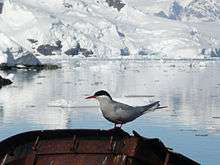Antarctic tern
The Antarctic tern (Sterna vittata) is a typical tern. It ranges throughout the southern oceans. It is very similar in appearance to the closely related Arctic tern, but is stockier, and the wing tips are grey instead of blackish in flight. It is in breeding plumage in the southern summer, when the Arctic tern has moulted to its non-breeding plumage (though this is not useful for separating it from another species, the South American tern).
| Antarctic tern | |
|---|---|
 | |
| Scientific classification | |
| Kingdom: | Animalia |
| Phylum: | Chordata |
| Class: | Aves |
| Order: | Charadriiformes |
| Family: | Laridae |
| Genus: | Sterna |
| Species: | S. vittata |
| Binomial name | |
| Sterna vittata Gmelin, 1789 | |
Breeding takes place from mid-November to early December. Chicks hatch from December to February. Skuas and jaegers are the primary predators of the bird's eggs and young.
The total global population of this bird is around 140,000 individuals.
Subspecies
There are six listed subspecies of the Antarctic tern.[2]
- S. v. tristanensis (Murphy, 1938) – Tristan da Cunha & Gough Island
- S. v. sanctipauli (Gould, 1865) – St. Paul & Amsterdam Islands.
- S. v. georgiae (Reichenow, 1904) – South Georgia, South Orkney & South Sandwich Islands
- S. v. gaini (Murphy, 1938) – South Shetland Islands, Antarctic Peninsula & nearby islands
- S. v. vittata (Gmelin, 1789) – Prince Edward, Crozet, Kerguelen, Bouvet & Heard Islands
- S. v. bethunei (Buller, 1896) – Stewart, Snares, Auckland, Bounty, Antipodes, Campbell & Macquarie Islands
Description
.jpg)
The Antarctic tern is a small bird at 31–38 cm (12-15 inches) long. Its bill is usually a dark red or blackish. It is mainly pale grey and white, but has a black cap when breeding. In non-breeding plumage it has a grizzled crown and white forehead. The tips of this tern's wings are greyish black.
The plumage of juveniles is white on the belly, foreneck, forehead, and breast. The back is grey and the bill is black. Immature birds have plumage similar to adult terns.
References
- BirdLife International (2013). "Sterna vittata". IUCN Red List of Threatened Species. 2013. Retrieved 26 November 2013.CS1 maint: ref=harv (link)
- Gill, Frank; Donsker, David, eds. (2019). "Noddies, gulls, terns, auks". World Bird List Version 9.2. International Ornithologists' Union. Retrieved 24 June 2019.
- Ian Sinclair, Phil Hockey and Warwick Tarboton, SASOL Birds of Southern Africa (Struik 2002) ISBN 1-86872-721-1
External links
| Wikimedia Commons has media related to Sterna vittata. |
- Antarctic tern - Species text in The Atlas of Southern African Birds
- The Antarctic tern at Birdlife International accessed August 25, 2006
